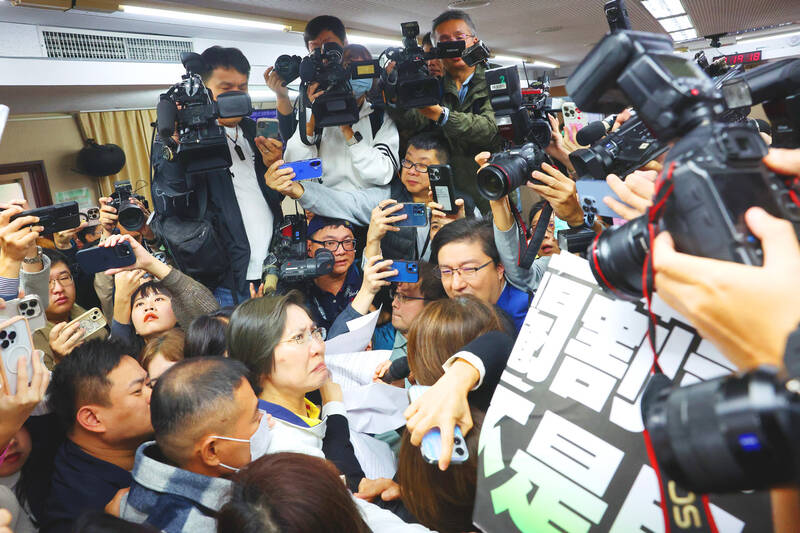Physical altercations broke out at the legislature in Taipei yesterday after Chinese Nationalist Party (KMT) lawmakers rushed through procedures on proposed amendments to increase the threshold to recall elected representatives.
The KMT, the Democratic Progressive Party (DPP) and the Taiwan People’s Party (TPP) could not agree on the wording of the proposed amendments to the Public Officials Election and Recall Act (公職人員選舉罷免法) at an Internal Administration Committee meeting, which was attended by Central Election Commission officials.
KMT Legislator Hsu Hsin-ying (徐欣瑩), a committee coconvener, was presiding, but DPP lawmakers occupied the podium area to protest alleged contraventions of procedures by Hsu.

Photo: CNA
The proposal to increase the recall threshold would deprive Taiwanese of their right to recall unfit, incompetent elected officials, or those found guilty of crimes, they said.
The three parties have tabled their own versions of the proposed amendments, with the KMT’s version the most restrictive, requiring submission of copies of national ID cards in signature drives, while for a recall to succeed, it must garner more votes than were cast for the election winner.
There was pushing and shoving as Hsu, supported by other KMT lawmakers, called for the meeting to start and gave no time for examination of the proposed amendments before suspending proceedings.
Legislator Chang Hong-lu (張宏陸) and DPP colleagues said that Hsu had not adhered to legislative procedures and contravened the rules by bringing a microphone from outside to make announcements.
DPP caucus chief executive Rosalia Wu (吳思瑤) said that the KMT was only interested in political struggle when legislators should be focused on economic and social issues, and working to improve people’s livelihoods.
Moreover, there should be public consultation on whether to change the rules regarding recalls, Wu said.
KMT Legislator Hsu Yu-chen (許宇甄), who initiated the amendments, said that they are needed, as recalls have succeeded “too easily” due to low thresholds.
The first-stage threshold for signatures runs counter to the “values of a democratic society” and wastes resources on political battles, she said.
TPP caucus whip Huang Kuo-chang (黃國昌) said that his party opposed the KMT’s version, as it is difficult to gauge the majority viewpoint among the myriad opinions of the public.
However, a survey conducted on behalf of the TPP showed that most respondents agreed that “more rigorous conditions must apply for signature campaigns in a recall bid, Huang said.
The survey showed 63.9 percent agreed with an ID requirement in signature drives, while 28.5 percent were not in favor and 7.6 percent did not express an opinion, he said.
DPP Legislator Puma Shen (沈伯洋) disputed the survey’s findings.
The pollsters used “suggestive questions” to lead respondents to give the answers favorable to the TPP, Shen said.
Huang’s citing of the survey were a tactic to avoid the core issue of whether TPP supports the KMT on the proposed amendments, Shen said.
While the TPP refuses to take a clear stance on many issues, wanting to seem as if there is distance between it and the KMT, its lawmakers are nonetheless cooperating with the KMT on many issues, he said.

DEFENSE: The National Security Bureau promised to expand communication and intelligence cooperation with global partners and enhance its strategic analytical skills China has not only increased military exercises and “gray zone” tactics against Taiwan this year, but also continues to recruit military personnel for espionage, the National Security Bureau (NSB) said yesterday in a report to the Legislative Yuan. The bureau submitted the report ahead of NSB Director-General Tsai Ming-yen’s (蔡明彥) appearance before the Foreign and National Defense Committee today. Last year, the Chinese People’s Liberation Army (PLA) conducted “Joint Sword-2024A and B” military exercises targeting Taiwan and carried out 40 combat readiness patrols, the bureau said. In addition, Chinese military aircraft entered Taiwan’s airspace 3,070 times last year, up about

A magnitude 4.3 earthquake struck eastern Taiwan's Hualien County at 8:31am today, according to the Central Weather Administration (CWA). The epicenter of the temblor was located in Hualien County, about 70.3 kilometers south southwest of Hualien County Hall, at a depth of 23.2km, according to the administration. There were no immediate reports of damage resulting from the quake. The earthquake's intensity, which gauges the actual effect of a temblor, was highest in Taitung County, where it measured 3 on Taiwan's 7-tier intensity scale. The quake also measured an intensity of 2 in Hualien and Nantou counties, the CWA said.

The Overseas Community Affairs Council (OCAC) yesterday announced a fundraising campaign to support survivors of the magnitude 7.7 earthquake that struck Myanmar on March 28, with two prayer events scheduled in Taipei and Taichung later this week. “While initial rescue operations have concluded [in Myanmar], many survivors are now facing increasingly difficult living conditions,” OCAC Minister Hsu Chia-ching (徐佳青) told a news conference in Taipei. The fundraising campaign, which runs through May 31, is focused on supporting the reconstruction of damaged overseas compatriot schools, assisting students from Myanmar in Taiwan, and providing essential items, such as drinking water, food and medical supplies,

New Party Deputy Secretary-General You Chih-pin (游智彬) this morning went to the National Immigration Agency (NIA) to “turn himself in” after being notified that he had failed to provide proof of having renounced his Chinese household registration. He was one of more than 10,000 naturalized Taiwanese citizens from China who were informed by the NIA that their Taiwanese citizenship might be revoked if they fail to provide the proof in three months, people familiar with the matter said. You said he has proof that he had renounced his Chinese household registration and demanded the NIA provide proof that he still had Chinese